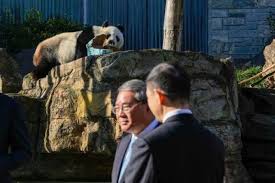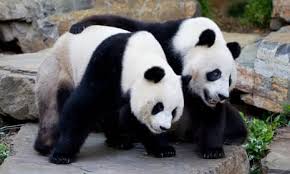New pair of giant pandas to further bolster Sino-Australian relations

China will loan a new pair of giant pandas to Australia to continue with the cooperative research on the conservation of the globally loved animal, Premier Li Qiang said on Sunday, as he visited Adelaide Zoo in Adelaide, Australia.
Li arrived in Adelaide on Saturday, the first stop of his official visit to Australia. His announcement about continued cooperation on giant panda conservation is considered as a message for the two countries to further stabilize their relationship.
Adelaide Zoo has been home to Wang Wang and Fu Ni since 2009, when the giant pandas were relocated to South Australia from Wolong National Nature Reserve in Southwest China’s Sichuan province.
The pair — the only giant pandas in the Southern Hemisphere — were on loan for 10 years as part of a giant panda breeding program, but have not bred despite several attempts made by the zoo.

The initial 10-year loan was extended by five years in 2019 with funding from the government of South Australia. The extension is due to expire at the end of this year.
At the Panda Pavilion in Adelaide Zoo, Li heard the reports presented by both Chinese and Australian experts on the cooperative research on giant panda conservation between the two countries, as well as on the breeding and care of the pandas in Australia.
He said the Chinese government has taken a host of measures over the years to protect giant pandas and achieved remarkable progress, contributing to global endeavors in conservation of biodiversity and protection of endangered species.
Li said he is glad to see that although far away from home, Wang Wang and Fu Ni have been looked after well and are living a happy life in Australia. They have become envoys of friendship between China and Australia and a symbol of the profound friendship between the two peoples, he added.
“This story tells us that as long as both sides are committed to taking good care of China-Australia cooperative relations, they can transcend the vast distance of the Pacific Ocean and differences between us to deliver common progress and win-win outcomes,” Li said.
Peter Malinauskas, premier of South Australia, told Li that the cute and cuddly giant pandas have captured the hearts of the people of the state and even the whole nation.
“When Wang Wang and Fu Ni first came to South Australia, it was a dramatic representation of a strong relationship between South Australia and the People’s Republic of China. We have no doubt that the significant responsibility of privilege that you have bestowed upon us today will be yet another representation of a continually strengthened relationship between Australia and China,” he said.
Australia is the second leg of Li’s three-nation tour, following his official visit to New Zealand. He will next visit Malaysia.
During his stay in Australia, Li and Australian Prime Minister Anthony Albanese will co-chair the ninth China-Australia Annual Leaders’ Meeting in Canberra and jointly attend a China-Australia CEO Roundtable Meeting in Perth.
Upon his arrival on Saturday, Li said that history has proved that respecting each other, seeking common ground while shelving differences, and carrying out mutually beneficial cooperation are valuable experiences in the development of China-Australia relations, and they need to be upheld and carried forward.
A more mature, stable and fruitful China-Australia comprehensive strategic partnership will be a shared asset for both peoples, he said.
China has been Australia’s largest trading partner for 15 consecutive years. Bilateral relations were severely damaged due to the negative policies adopted toward China by the previous Australian government. The two countries have broken the ice since Albanese assumed office in 2022.
Li’s visit follows Albanese’s visit to China in November, when leaders of the two countries agreed to resume key bilateral dialogues and advance cooperation in various fields. Over the past months, China has lifted trade curbs on Australian imports, including wine, barley, beef and timber.
In an article titled “Working productively with China will benefit everyone in the region”, which was published by The Australian on Wednesday, Albanese wrote that Australia and China are two very different nations, with different systems of government and different ways of looking at the world.
“Points of contention are inevitable; what matters is how you manage them,” he said in the article, adding, “I take the view that whatever our differences might be, it is always better when we can deal with each other directly, through dialogue.”





